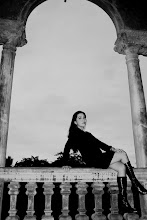My Dear Students,
In carving up your way to writing, find your
peace in reading through this excerpt, and May you understand that what I’m
sharing is one guiding light that is above reproach.
Letters To A Young Poet are
ten letters written to a young man about to enter the German military. His name
was Franz Kappus, he was 19 years old, and he wrote Rilke looking for guidance
and a critique of some of his poems. Rilke was himself only 27 when the first
letter was written. The resulting five year correspondence is a virtual owner's
manual on what it is (and what is required) to be an artist and a person.
Paris
February
17, 1903
Dear
Sir,
…There is only one thing you should do. Go into
yourself.
Find out the reason that commands you to write; see whether it has spread its roots into the
very depths of your heart; confess to yourself whether you would have to die if
you were forbidden to write. This most of all: ask yourself in the most silent
hour of your night: must I write? Dig into yourself for a deep answer. And if
this answer rings out in assent, if you meet this solemn question with a
strong, simple "I must", then build your life in accordance with this
necessity; your whole life, even into its humblest and most indifferent hour,
must become a sign and witness to this impulse. Then come close to Nature.
Then, as if no one had ever tried before, try to say what you see and feel and
love and lose.
Don't write love poems; avoid those forms that
are too facile and ordinary: they
are the hardest to work with, and it takes a great, fully ripened power to
create something individual where good, even glorious, traditions exist in
abundance.
So rescue yourself from these general themes
and write about what your everyday life offers you; describe your sorrows and desires, the thoughts
that pass through your mind and your belief in some kind of beauty Describe all
these with heartfelt, silent, humble sincerity and, when you express yourself,
use the Things around you, the images from your dreams, and the objects that
you remember.
If your everyday life seems poor, don't blame
it; blame yourself; admit to yourself that you
are not enough of a poet to call forth its riches; because for the creator
there is no poverty and no poor, indifferent place. And even if you found
yourself in some prison, whose walls let in none of the world's sound -
wouldn't you still have your childhood, that jewel beyond all price, that
treasure house of memories? Turn your attention to it.
Try to raise up the sunken feelings of this
enormous past; your personality will grow stronger, your solitude
will expand and become a place where you can live in the twilight, where the
noise of other people passes by, far in the distance. And if out of, this
turning within, out of this immersion in your own world, poems come, then you
will not think of asking anyone whether they are good or not. Nor will you try
to interest magazines in these works: for you will see them as your dear
natural possession, a piece of your life, a voice from it.
A work of art is good if it has arisen out of
necessity. That is the only way one can judge it. So, dear Sir, I
can't give you any advice but this: to go into yourself and see how deep the
place is from which your life flows; at its source you will find the answer to,
the question of whether you must create. Accept that answer, just as it is
given to you, without trying to interpret it. Perhaps you will discover that
you are called to be an artist. Then take that destiny upon yourself, and bear
it, its burden and its greatness, without ever asking what reward might come
from outside. For the creator must be a world for himself and must find
everything in himself and in Nature, to whom his whole life is devoted. …
Yours
very truly,
Rainer
Maria Rilke















No comments:
Post a Comment